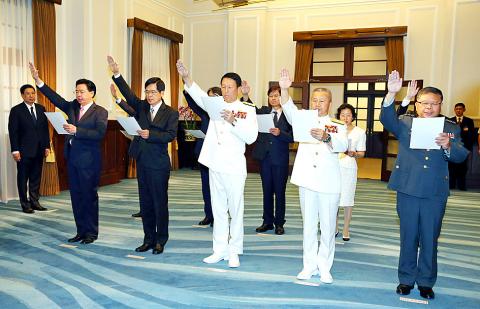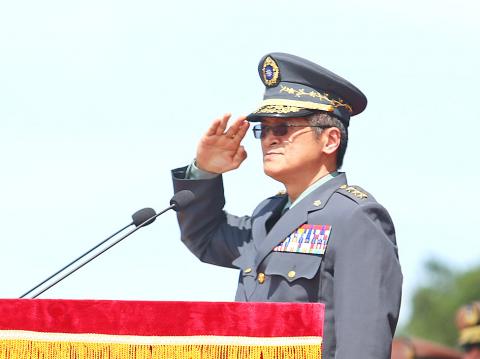The purpose and duties of President Tsai Ing-wen’s (蔡英文) National Security Council (NSC) are obscure, and despite a reshuffle of members, no clear strategic objectives have emerged, former national security officials said.
Tsai’s appointments seem to support no particular policy direction, compared with the national security teams of former presidents Chen Shui-bian (陳水扁) and Ma Ying-jeou (馬英九), which highlighted foreign policy and cross-strait relations respectively, former officials said.
Former chief of the General Staff Yen Teh-fa (嚴德發) and academic Tsai Ming-Yen (蔡明彥) were sworn in on Monday last week as NSC secretary-general and deputy secretary-general respectively.

Photo: CNA
The other two NSC deputy secretaries-general are polling expert Chen Chun-lin (陳俊麟) and national defense expert Chen Wen-jenq (陳文政). The five NSC advisers are lawyer and judicial reform leader Lin Feng-jeng (林?正), international finance lawyer Lin Liang-jung (林良蓉), Academia Sinica fellow and information security expert Lee Der-tsai (李德財) and former Mainland Affairs Council (MAC) deputy ministers Fu Dong-cheng (傅棟成) and Tung Chen-yuan (童振源).
Chen Shui-bian’s national security team was focused on expanding foreign relations, and former NSC secretaries-general Chiou I-jen (邱義仁), Mark Chen (陳唐山) and Kang Ning-hsiang (康寧祥) were in charge of developing ties with the US, according to a source who spoke on condition of anonymity.
During the same period, NSC deputy secretaries-general and other council members — including now-MAC Deputy Minister Lin Cheng-yi (林正義) and Taichung Mayor Lin Chia-lung (林佳龍) — were responsible for analyzing foreign relations, the source said.

Photo: CNA
Ma was pushing the Economic Cooperation Framework Agreement with China and aiming to develop cross-strait relations, so his NSC appointments — including former NSC secretary-general Su Chi (蘇起) and deputy secretary-general Kao Charng (高長) — were designed to forward that goal, the source said.
Experts in cross-strait trade were later added to Ma’s NSC team, including former minister of economic affairs John Deng (鄧振中) and former MAC minister Wang Yu-chi (王郁琦).
The NSC has four major roles: mid and long-term strategic planning, tactical operations for immediate purposes, daily administration and crisis management, former NSC deputy secretary-general Chang Jung-feng (張榮豐) said.
The NSC has to formulate plans for cross-strait and foreign relations to be employed over the next decade, but it also has to respond to rapidly changing events, such as the 1996 Taiwan Strait Crisis, which took place during former president Lee Teng-hui’s (李登輝) tenure, Chang said.
“The NSC is very important if it is valued by the president, but not important at all if it is not valued by the president,” Chang said.
The NSC advises the president on national security issues such as defense, foreign relations, cross-strait ties and major national emergencies, former NSC deputy secretary-general Michael Tsai (蔡明憲) said.
“It does not suit the NSC’s purpose to have judicial reform and polling experts in the NSC leadership,” Michael Tsai said.
The US last year passed the National Defense Authorization Act for Fiscal Year 2017 authorizing senior military exchanges with Taiwan, but Taipei has remained too conservative to seek increased military ties with the US, he said.
That Tung was appointed to the NSC last year after he resigned as Cabinet spokesman suggested that “Tsai Ing-wen does not place a high value on NSC functions,” the source said.
Tung is rumored to have been appointed representative to Thailand, the source said, adding that the president should use the opportunity to reorganize the NSC, as Tsai Ming-Yen is the only official tasked with foreign policy management, and that provides too little support for a Democratic Progressive Party government that is seeking to expand the nation’s international space.

A strong continental cold air mass is to bring pollutants to Taiwan from tomorrow, the Ministry of Environment said today, as it issued an “orange” air quality alert for most of the country. All of Taiwan except for Hualien and Taitung counties is to be under an “orange” air quality alert tomorrow, indicating air quality that is unhealthy for sensitive groups. In China, areas from Shandong to Shanghai have been enveloped in haze since Saturday, the ministry said in a news release. Yesterday, hourly concentrations of PM2.5 in these areas ranged from 65 to 160 micrograms per cubic meter (mg/m³), and pollutants were

Taiwan’s armed forces have established response protocols for a wide range of sudden contingencies, including the “Wan Chun Plan” to protect the head of state, the Ministry of Defense (MND) said today. After US President Donald Trump on Saturday launched a series of airstrikes in Venezuela and kidnapped Venezuelan President Nicolas Maduro, concerns have been raised as to whether China would launch a similar “decapitation strike” on Taiwan. The armed forces regularly coordinate with relevant agencies and practice drills to ensure preparedness for a wide range of scenarios, Vice Minister of National Defense Hsu Szu-chien (徐斯儉) told reporters before a

EVA Airways on Saturday said that it had suspended a pilot and opened an investigation after he allegedly lost his temper and punched the first officer several times as their plane was taxiing before takeoff at Los Angeles International Airport. According to a report published on Thursday by The Reporter, the incident occurred after the flight’s Malaysian first officer tried to warn the Taiwanese pilot, surnamed Wen (文), that he was taxiing faster than the speed limit of 30 knots (55.6kph). After alerting the pilot several times without response, the first officer manually applied the brakes in accordance with standard operating

NOT AN OPENING: Trump’s violation of international law does not affect China’s consideration in attacking Taiwan; Beijing lacks capability, not precedent, an official said Taiwanese officials see the US’ capture of the president of Venezuela as a powerful deterrent to Beijing’s aggression and a timely reminder of the US’ ability to defeat militaries equipped with Chinese-made weapons. The strikes that toppled Venezuelan President Nicolas Maduro signaled to authoritarian leaders, including Chinese President Xi Jinping (習近平), US President Donald Trump’s willingness to use military might for international affairs core to US interests, one senior official in Taipei’s security circle said. That reassured Taiwan, the person said. Taipei has also dismissed the idea that Trump’s apparent violation of international law could embolden Beijing, said the official, who was not